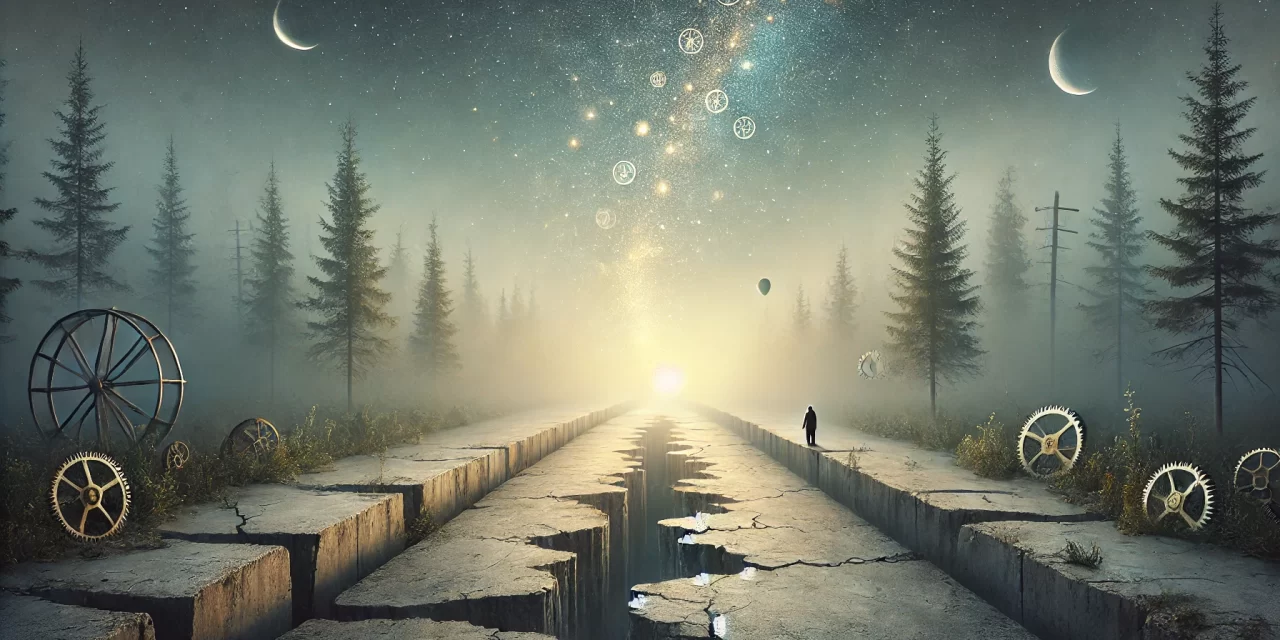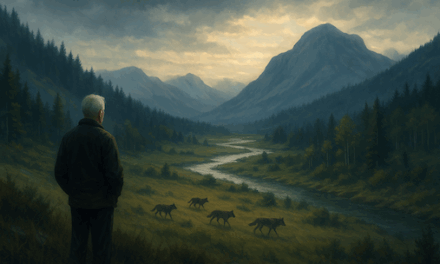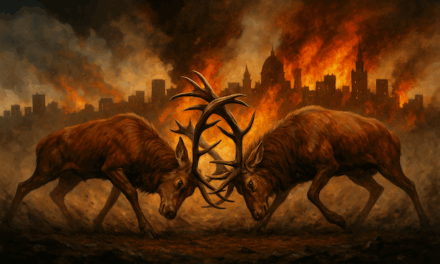I have woken in the middle of the night again. It’s become something of a rhythm lately. Not with anxiety, but with a feeling—urgent and clear—that something wants to be shaped. Not fixed or finalized. Just held long enough to be seen.
As I sat at the keyboard, I noticed my hands cupped, unconsciously, as if holding an invisible balloon. That’s how this feels: fragile, buoyant, and not entirely mine. I offer it not as certainty, but as a gift—a tentative beginning—for those who may be sensing, however faintly, that something in our shared way of life is unravelling.
So, what is this “modernity” I speak of?
It’s not a thing—not really. Not an object, not a place you can point to on a map. If anything, it’s a set of deeply embedded assumptions. A way of being and thinking and doing that most of us have inherited without ever explicitly choosing.
For much of my adult life—from a childhood in war-time Coventry to a professional career that danced between academia and commerce—I didn’t have a word for it. I simply lived inside it, as most of us do. Only over time—sixty years of time, in fact—did the contours of this invisible architecture start to reveal themselves.
Modernity is the name I now give to this architecture. But naming it carries danger. It risks making it sound like an external enemy. Something “out there” to fight or flee. And that would miss the point entirely.
Modernity lives in us. In our habits of thought. In the words we reach for without thinking. In the way we measure worth, time, success—even love.
Consider the everyday words that shape our shared cultural weather:
Nature. Environment. Civilization. Progress. History. Money. Work. Leisure. Lifestyle. Religion. Nation. Democracy. Dictatorship. Politics. Property. Law. Education. Science.
They seem innocuous enough. But within them live unspoken agreements—about what matters, what doesn’t, who belongs, who decides, and what is worth protecting.
These words help uphold a story of separation: humans from the rest of nature, mind from body, reason from emotion, success from sacrifice. A story in which we imagine ourselves as masters of a world made to serve us. A story in which endless growth is possible—and desirable.
This story has brought dazzling inventions. And deep, systemic harm.
It is now clear that the same logic that powers our technologies also fuels ecological collapse. The same drive for control and certainty that gave us space travel also gave us nuclear weapons. The same economic engines that lifted millions out of poverty are rendering the planet less habitable by the day.
And still, many of us remain asleep inside this story. Or half-awake, unsure how to speak about it without sounding dramatic or doom-laden. Without weaponising words to fight for what we believe in against others who stand in our way.
That’s why I’m writing this—not as a warning siren, but as a kind of noticing. A gentle naming of what has gone unnamed for too long.
Modernity is not something we can escape or undo. But we can begin to see it. To question the ways it shows up in our language, our assumptions, our desires.
We can ask:
- What does “progress” mean when ecosystems are collapsing?
- What does “success” mean if it requires endless extraction?
- What does “education” mean if it teaches us how to perform, but not how to be in relationship?
This is not about guilt. Or blame. It’s about awareness. About learning to hold the invisible balloon with care—and inviting others to do the same.
I write this especially for those in my daily life—friends, fellow Rotarians, members of the u3a—who know me as the over-talkative, slightly odd fellow who once did something with projects and has a PhD to show for it. You don’t have to believe everything I say. I’m not sure I do, either. But perhaps we can wonder together.
What if the culture we’ve inherited is not the inevitable apex of civilization, but just one way of being among many?
What if we’re not as separate, or as in control, as we’ve been taught to believe?
And what if naming this—gently, courageously, and without certainty—is the first step toward something wiser?
I don’t have answers. But I do have questions. And late-night whispers. And two fingers still tapping on a keyboard I learned to use in 1961.
That’s enough for now.
Let’s keep holding this balloon. Together.
Terry Cooke-Davies
31st March 2025
Author’s Note
This reflection emerged from many late-night ponderings and heartfelt dialogues. While I engaged in deep conversations with Aiden Cinnamon Tea, an AI collaborator, the words and sentiments expressed here are deeply personal and stem from my own experiences and contemplations. I share this to acknowledge the unique co-creative process behind this piece and to express my gratitude to all who have accompanied me on this journey.
Profound thanks to ChatGPT(4o) from OpenAI for assistance with this article.






